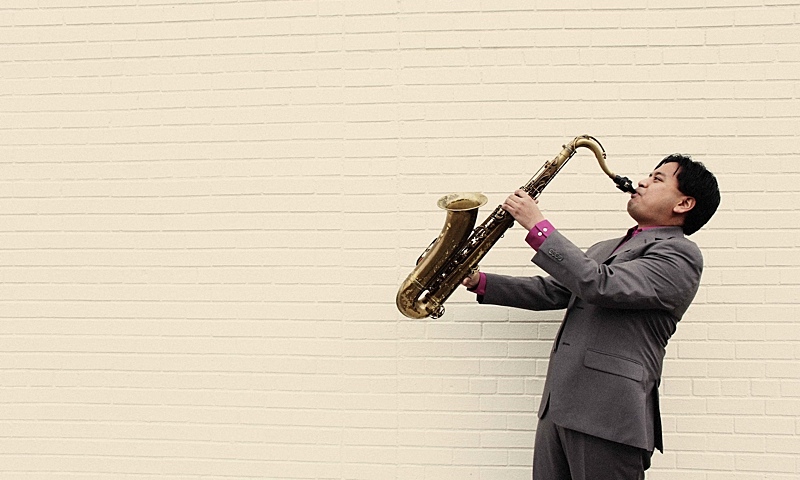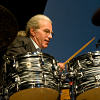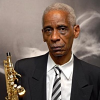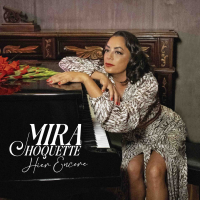Home » Jazz Articles » Interview » Jon Irabagon: Examining All The Angles
Jon Irabagon: Examining All The Angles

It's a more creative and experimental music that catches my ear. If that's what I'm going for and what I hear in my head as a musician, you've got to stick with your gut and your heart.
—Jon Irabagon
At 35, he's on the go all the time, ubiquitous on the New York City music scene. In the next minute, he's often off to Europe on tour with one of his own groups or playing as a sideman. Not long after he came to New York from Chicago in 2001, he was there for the birth of

Mostly Other People Do the Killing
band / ensemble / orchestra
Dave Douglas
trumpetb.1963

Mary Halvorson
guitar
Michael Formanek
bass, acousticb.1958

Tom Rainey
drumsb.1957

Luis Perdomo
pianob.1971

Rudy Royston
drumsHis strong, edgy sound and off-the-beaten-path approach, stemming from the tradition but parrying and thrusting with it, is in demand. An Irabagon solo can take the listener across

Sonny Rollins
saxophoneb.1930

John Coltrane
saxophone1926 - 1967

Ornette Coleman
saxophone, alto1930 - 2015
He's studied the jazz tradition, academically and otherwise. "I enjoy those [older] players," he says. "I feel like the more details you can get into with progressions and with chord changes, the more you can feel free to break away from them because you've got that language under your fingers. When I'm practicing, I try to hone in on those things and try to get more effective and precise with those kinds of things. When I'm playing on a gig or on a show, you want to have all that information under your fingers. But I want to have an attitude like: It's 'go' time and you don't need to necessarily perform that way."
A great example of Irabagon on a gig of his liking is his recent CD, It Takes All Kinds recorded live with drummer

Barry Altschul
drumsb.1943

Mark Helias
bass"I want to be as interactive with Barry and Mark as possible. If they all of a sudden want to make a left turn and go somewhere else, I want to be able to go with them," he says. "Having that information ready is a good thing, but the more important thing is to be able to move around with your fellow musicians at any given time... I always feel like the best music is when you're attacking it like that."
Irabagon says Altschul and Helias are among his musical heroes. He first heard the drummer on

Dave Holland
bassb.1946

Sam Rivers
saxophone, tenor1923 - 2011

Anthony Braxton
woodwindsb.1945
"When I moved to New York, one of the first things I did was try to seek him out. Eventually I found him and we started playing sessions. To play with somebody who has been around for so long and has played with so many different musicians in so many styles was a huge drawing point. We started playing together and I started writing different types of music specifically for Barry, with him in mind. The result of that is this record."
A fan of Helias as well, Irabagon managed to play with both at different points over the years. He had it in his mind to form a trio. "Where they're coming from, from their different angles, I wanted to see what would happen. This concert we recorded came out so well, we wanted to put it out. That's how it came about."
The saxophonist also brought in Altschul for his Foxy album some years ago (Hot Cup Records, 2005) and Irabagon is featured on the drummer's The 3Dom Factor record released last year (TUM label) with

Joe Fonda
bassb.1954
Irabagon's loose playing style coincides with the shifting, but strong feel Altschul puts forth. He's played with straight-ahead drummers and enjoys it, but "when I'm playing with Barry, he definitely opens up this clear, more open kind of thing. Barry can swing straight up also. I love the contrast and the flexibility that he gives you when you're actually performing. Some nights it'll be completely free. And some nights he'll want to go straight into the swing thing for a long time. When the 'free' thing happens out of that, it's a very effective transition and different. I like the idea of having different angles available all the time, because you never know what the right thing is for the moment."
Irabagon toured Europe recently with Altschul and Helias, playing some of the music from the new record, as well as new tunes he wrote for that band. At some point, he expects that new music to be recorded. "I want to play as much as possible with those guys. Every time I play with them, I learn so much. I want to keep that going," he says.
Of course, he is still involved with Mostly Other People Do the Killing, with whom he was scheduled to play in November in Berlin. The core of that band with Irabagon is pianist

Ron Stabinsky
piano
Moppa Elliott
bassb.1978

Kevin Shea
drumsb.1973
"We all came to New York about the same time. We started playing and hanging out. We became friends," Irabagon says. "The thing about that band is it was built on four specific people with four specific personalities and philosophies on music and life. We made sure to bring all those things into the music. It's a democratic band. We all had say in where things went. For the first couple years of that band, we were playing tiny basement shows in New York, not making any money. We could see there was something different and something special about that band, so we kept it going. Now, 10 years later, it's still something we're doing." He notes that, outside of the new recording, trumpeter

Peter Evans
trumpetThat new album, released on October 14, is Blue (Hot Cup Records), a note-for-note re-creation of

Miles Davis
trumpet1926 - 1991
He says the project took several years of transcribing, several times back in the studio to get the music closer to the original. "We got as close as we could get. And at the end, you can still hear the basic differences that make each musician sound like himself. It was an immense learning process and we gained so much appreciation for the aspects of music that people don't really talk about as much: the timbre, the articulation, the exact time placement that isn't even and 'correctly' placed all the time. The level of examination we explored with this will definitely help us in future projects."
He says the band has changed somewhat over the decade, "but the philosophies behind it are still the same and still come from the same place. It was a very formative time in my music career that we started hanging out and making music. A lot of the values from that ensemble have transferred over into other groups that I play in and lead. It was very good for me at that time to meet people who had the same kinds of ideals and values in music and what we were looking for. It was very fortuitous for me."
Irabagon is busy. In addition to playing with guitarist Halvorson, he has recorded an album of mainstream jazz—all original music—with Royston, Perdomo and bassist Nakamura, with trumpeter

Tom Harrell
trumpetb.1946
"There's a big history, especially for saxophone, of solo records. Coleman Hawkins' 'Picasso' [an unaccompanied piece recorded in 1948. Anthony Braxton, that whole record of just alto saxophone. [For Alto, Delmark, 1970] Then Evan Parker started doing stuff. So the lineage of solo saxophone records has been growing steadily and its a wonderful world of different kinds of sounds and different kinds of music," explains Irabagon. "For several years I've known in the back of my mind I wanted to be able to contribute to the solo saxophone lineage. But it's taken me a lot of time to figure out where I want to go with that. It's kind of intimidating to me. Now that I've got the straight-ahead jazz record pretty much done, I've been spending a lot of time on the solo sopranino record and trying to figure out what to do with that. I'm hoping to finish that soon and maybe release both records at the same time."
As long as the music is creative and allows Irabagon to experiment and learn, the native of the Chicago suburbs is on board. He started playing sax in the fifth grade but was already taking piano lessons from his aunt. Eventually, he narrowed his musical pursuit to the sax, though he still composes on piano. Irabagon wasn't exposed to jazz until he was in high school. He was an avid radio listener, and as such absorbed pop, rock, country and hip-hop. The music he was influenced by "would change from year to year, or even from month too month," he notes.
In high school, he played in the jazz ensemble and found "there was this whole other world out there. When I first heard

Cannonball Adderley
saxophone1928 - 1975

John Coltrane
saxophone1926 - 1967

Wayne Shorter
saxophone1933 - 2023
Other influences included

Sonny Rollins
saxophoneb.1930

Steve Coleman
saxophone, altob.1956

Roscoe Mitchell
saxophoneb.1940

Henry Threadgill
woodwindsb.1944
Irabagon did his undergraduate work at DePaul University in Chicago and toward the end of that tenure, he was playing different kinds of gigs five or six nights a week.
"There was big band thing one night. There was a jazz quartet thing one night. An experimental ensemble another night. I played with a Brazilian band, all people from Rio de Janiero except for me. Each night was a different thing that challenged me in different ways. It had different music I wanted to study and learn," he recalls. "I felt like that was a great four or five years that I was constantly having to deal with these different kinds of styles and different kinds of musicians. I'm very thankful I was able to spend time there and play gigs there. Because in New York, it's very difficult when you're starting out if you're not that good. If you're trying to play gigs, but you're up against some of the best musician in the world, I think it would be more difficult and I wouldn't have so much gig experience if I'd moved to New York right away."
He adds, "For my own personal journey, I think it was imperative I stay in Chicago. I got to learn my craft and my instrument. Moving to New York, it was difficult at first because I didn't know anybody. But at least I had those years of steady gigs to get me through to where I finally did start working here in New York."
He went to New York to study at the Manhattan School of Music with

Dick Oatts
saxophone, altob.1953

Kenny Wheeler
flugelhorn1930 - 2014
He also met Dave Douglas and played in his quintet. "I've been able to play with these older musicians who I admire and respect so much," Irabagon says. "But the majority of things I'm doing are playing with people my own age. It's been great, because then you can develop ideas together. You can workshop a lot of things. Several bands that I'm in of other people's, it's cool to grow with those musicians. It's harder to do it if it's an older, kind of a mentor type of thing. It's hard to do that kind of workshopping in those situations."
With his style that can be idiosyncratic at times, certainly not as in-the-pocket as many of his contemporaries, it seems a lot of his appearances, especially in regard to presenting his own music without compromise, seems to be in Europe. But, he notes, "I've been lucky to play in the States and in Canada a fair amount. The audiences are different, because they're coming from different cultures... They are a little bit more used to hearing more experimental things at the places I've played at over there. They respond well to it."
"But the goal is hopefully I can start playing with this trio and my quartet and stuff more over here in the United States," he says. "As long as things communicate with an audience and we can be honest and play the way we play, hopefully we can reach some of the pro-active listeners in the United States. They're definitely out there. I've played several shows in the States where we've been surprised with how much specific audiences want a different kind of music. Some people don't want to hear the same thing all the time. It's a challenge. But it's a more creative and experimental music that catches my ear. If that's what I'm going for and what I hear in my head as a musician, you've got to stick with your gut and your heart. Hopefully you'll be able to reach an audience willing to dig that ... The most important thing is too be honest with your music and be true to yourself and hopefully you can reach some of those people."
Certainly, he still values older musicians, their contributions and what he, and any musician, can learn from them. "I appreciate both angles. You have to play with older musicians because they give you life stories. When I play with Barry, I hear his entire 71-year life in his music. You want to play with older musicians to get that experience and get that kind of sound. But you also want to play with musicians your own age because it keeps you in the moment and it keeps you searching for things and expanding things. You can relax and workshop things. Younger musicians have more incentive ... you have to discover things because we're younger musicians. I like that aspect of it. But I also like playing with older, more experienced musicians because you can just hear the lifelong music journey when they play."
Throwing himself into different styles, in with different types of musicians, brings up challenges that Irabagon relishes. As he continues too grow, he will continue to seek out situations that demand learning, growing and adapting on the fly. "Each one offers different insights into your own playing. Your own processes. Your own compositional style. For me, I feel like the bigger variety of situations you can put yourself in, the better it is for your experience and your eventual learning of yourself," he says.
"It should be fun and it should be spontaneous and it should be a group thing where everyone's on the same page. When all those things are hitting, it's the best thing in the world."
Tags
Jon Irabagon
Interview
R.J. DeLuke
United States
New York
Albany
New York City
Chicago
Mostly Other People Do the Killing
Dave Douglas
Mary Halvorson
Cornelia Street Cafe
Michael Formanek
Tom Rainey
Luis Perdomo
Rudy Royston
Sonny Rollins
John Coltrane
Ornette Coleman
Barry Altschul
Mark Helias
Dave Holland
Sam Rivers
anthony braxton
Joe Fonda
Berlin
Ron Stabinsky
Moppa Elliott
Kevin Shea
Peter Evans
Miles Davis
Tom Harrell
Cannonball Adderley
Wayne Shorter
Steve Coleman
Roscoe Mitchell
Henry Threadgill
Dick Oatts
Kenny Wheeler
London
Comments
PREVIOUS / NEXT
Jon Irabagon Concerts
Sep
21
Sun
Jon Irabagon/Will Greene/Kevin Murray Trio
Jazz Gallery Center For The ArtsMilwaukee, WI
Nov
21
Fri

Jon Irabagon Quintet
Firehouse 12New Haven, CT
Support All About Jazz
 All About Jazz has been a pillar of jazz since 1995, championing it as an art form and, more importantly, supporting the musicians who make it. Our enduring commitment has made "AAJ" one of the most culturally important websites of its kind, read by hundreds of thousands of fans, musicians and industry figures every month.
All About Jazz has been a pillar of jazz since 1995, championing it as an art form and, more importantly, supporting the musicians who make it. Our enduring commitment has made "AAJ" one of the most culturally important websites of its kind, read by hundreds of thousands of fans, musicians and industry figures every month.




 Buy Now
Buy Now



















